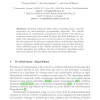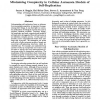367 search results - page 37 / 74 » Captive Cellular Automata |
UPP
2004
Springer
14 years 1 months ago
2004
Springer
Evolving solutions rather than computing them certainly represents an unconventional programming approach. The general methodology of evolutionary computation has already been know...
ISMB
1993
13 years 9 months ago
1993
Understanding self-replication from an information processing perspective is important because, amongother things, it can shed light on molecular mechanismsof biological reproduct...
ENVSOFT
2007
13 years 7 months ago
2007
A multi-agent model of social and environmental complexity of deforestation was developed for the Caparo Forest Reserve, Venezuela. It includes three types of agents: settlers, go...
ACRI
2008
Springer
14 years 2 months ago
2008
Springer
In several cases, the DNA sequences of an organism are available in different stages of its evolution and it is desirable to reconstruct the DNA sequence in a previous evolution st...
CEC
2007
IEEE
14 years 2 months ago
2007
IEEE
— Cellular Automata (CAs) have been investigated extensively as abstract models of the distributed systems composed of autonomous entities characterized by local interaction. How...


